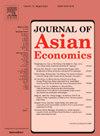Spatial dependence and heterogeneity regime effect on the allocation of Korea’s international aid to recipients
IF 3.4
3区 经济学
Q1 ECONOMICS
引用次数: 0
Abstract
This study uses spatial heterogeneity regime models to analyze the allocation of Korea’s official development assistance (ODA) to 55 recipient countries, and examines whether recipient countries’ level of democracy or political stability, distance from Korea, trade, gross domestic product, global ODA, or global foreign direct investment have spatial and spatial heterogeneity regime effects on the determinants of Korea’s ODA to recipient countries. Despite the spatial effects, if we use the non-special ODA model the estimators will be inconsistent. However. the empirical results found new facts that the allocation of Korea’s ODA have the spatial dependence effects and spatial heterogeneity effects across four regimes, such that the estimation of the determinants of Korea’s ODA differs across Asia, Africa, Europe, and Pacific and Central America. Therefore, the spatial heterogeneity regime model is needed to analyze the determinants of Korea’s ODA and to adopt more effective ODA policies.
空间依赖与异质性制度对韩国国际援助分配的影响
本研究利用空间异质性制度模型分析了韩国对55个受援国的官方发展援助(ODA)分配,并考察了受援国的民主或政治稳定水平、与韩国的距离、贸易、国内生产总值、全球官方发展援助或全球外国直接投资是否对韩国对受援国的官方发展援助的决定因素具有空间和空间异质性制度影响。尽管存在空间效应,但如果我们使用非特殊ODA模型,估计量将不一致。然而。实证结果发现了新的事实,即韩国官方发展援助的分配在四种制度下具有空间依赖效应和空间异质性效应,因此对韩国官方发展援助决定因素的估计在亚洲、非洲、欧洲、太平洋和中美洲存在差异。因此,需要空间异质性制度模型来分析韩国官方发展援助的决定因素,并采取更有效的官方发展援助政策。
本文章由计算机程序翻译,如有差异,请以英文原文为准。
求助全文
约1分钟内获得全文
求助全文
来源期刊

Journal of Asian Economics
ECONOMICS-
CiteScore
4.70
自引率
9.40%
发文量
90
期刊介绍:
The Journal of Asian Economics provides a forum for publication of increasingly growing research in Asian economic studies and a unique forum for continental Asian economic studies with focus on (i) special studies in adaptive innovation paradigms in Asian economic regimes, (ii) studies relative to unique dimensions of Asian economic development paradigm, as they are investigated by researchers, (iii) comparative studies of development paradigms in other developing continents, Latin America and Africa, (iv) the emerging new pattern of comparative advantages between Asian countries and the United States and North America.
 求助内容:
求助内容: 应助结果提醒方式:
应助结果提醒方式:


